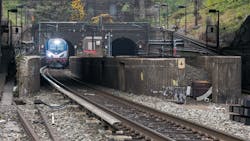OP-ED: A National Infrastructure Bank could solve the U.S.’s trillion-dollar infrastructure investment challenge
Everybody agrees the United States’ crumbling infrastructure must be fixed. The problem is nobody knows how to pay for it. Most of the nation’s infrastructure needs are within the transportation/transit sector, especially with the emergence of an integrated rail transportation network. There is a need for both a high-speed rail system and an integrated conventional rail network. The nation needs to get its traveling citizens off the overcrowded roads and highways. The Coalition for a National Bank has the answer.
As Congress takes up the issue of financing infrastructure through the budget process, we urge the immediate creation of a new National Infrastructure Bank (NIB). This bank will cover projects that the federal budget and state and local governments are not able to cover.
The need for such a bank was underscored yet again when the American Society of Civil Engineers issued its quadrennial Report Card for the United States and graded the nation’s overall infrastructure as a C-. ASCE estimated that the gap between what is currently funded and what is needed over the next 10 years has grown to $2.6 trillion. The country needs to spend nearly $6 trillion to bring the infrastructure to a state of good repair. Highlights of the Report Card include:
- Growing wear and tear on the nation's roads have left 43 percent of public roadways in poor or mediocre condition, a number that has remained stagnant over the past several years.
- Currently, 42 percent of all bridges are at least 50-years old, and 46,154 are considered structurally deficient, meaning they are in “poor” condition, but still in use and waiting to collapse.
Congress will fund a certain amount of this through the budget. We support that. A new National Infrastructure Bank will finance the rest, approximately $5 trillion. This will include all the new 21st century projects such as: universal broadband, cybersecurity, high-speed rail, the Hudson River Tunnels between New York and New Jersey and replacing the Brent-Spence Bridge in Kentucky.
As embodied in HR 6422, National Infrastructure Bank Act of 2020, the National Infrastructure Bank will be capitalized with existing Treasury debt so it will require no new federal spending and no new federal taxes. It will be capitalized at $500 billion and authorized to invest $5 trillion to fix all the infrastructure.
This bank is modeled on four previous institutions, which built much of the infrastructure of the nation. The last one, Franklin Roosevelt’s Reconstruction Finance Corporation, helped end the Great Depression and win WWII.
The new NIB will work side by side with state and municipal governments, and transit and port authorities to invest more than $1 trillion to fix all surface transportation. Also, it will partner with the proposed Biden Administration transit and passenger rail allocations and invest $1 trillion to launch a nationwide high-speed rail system.
The National Infrastructure Bank will create 25 million new jobs, pay Davis-Bacon wages and mandate Buy American provisions.
It will ensure the robust hiring of minority populations and disadvantaged business enterprises. It will supercharge industry and small business, who will benefit from the $4-5 trillion in spending.
It is appealing to both Republicans and Democrats because it requires no new federal taxes or debt, creates millions of jobs and fixes what’s broken.
In summary, this legislation would address roads, bridges and transit; electric generation and the transmission grid, including cybersecurity; schools; dams, levees, waterways and ports; airports; rail; total broadband access; drinking water and wastewater systems; public parks and recreation facilities; and hazardous and solid waste.
The time to act is now. Delaying any longer will result in increased costs, as many projects will be beyond repair and require a full replacement. Please join this expanding effort. To learn more, visit the Coalition for the National Infrastructure Bank’s website – www.nibcoalition.com.
----------------
Stanley Forczek has more than four decades of experience in transportation/energy planning and management and currently serves on the Advisory Team of the Coalition for the National Infrastructure Bank.
About the Author

Stanley R. Forczek
Strategic Business Partner
Stanley Forczek offers clients over four decades of experience in transportation/energy planning and management, including many years with Amtrak. He was the first Director of Finance for the Northeast Corridor as well as the initial Director for Strategic Planning. He furthered his career within the area of energy management where his responsibilities included the economic dispatch of a 1,200-mile electric transmission network and power pool; team leader for conveyance of railroad infrastructure and electrification New Haven CT to Boston. Mr. Forczek has extensive experience with electric regulatory bodies (PJM, NY-ISO, ISO-NE, FERC) and several State Commissions on issues such as market development, transmission utilization, transmission overbuild, generation development, and as an expert witness. While at Amtrak, Mr. Forczek was responsible for an annual energy budget of more than $400 million. He established guidelines and business models for an integrated energy management system, and developed several projects to monetize energy asset capabilities throughout the national system. He is adept at integrating traction/transit operations (60 or 25 Hz) to energy management and planning. His procurement strategies saved Amtrak tens of millions of dollars. Over his career, Mr. Forczek has procured approximately 900 megawatts of electricity (both traction and non traction) and more than 750,000 dekatherms of natural gas.
Mr. Forczek has managed energy procurements for large-scale institutional users, handling all phases from presentation and negotiation, through execution of procurement contracts and management of the supply relationships after implementation. While he has particular experience in the mid-Atlantic and New England regions, Mr. Forczek has directed supply solicitations throughout the United States. Mr. Forczek provides in-depth understanding of the dynamics of regional and global energy markets, as well as the supporting infrastructure from both the supplier and client perspective. He has developed strategic partnerships with many constituents of clients and users of their facilities with generation developers, assisting them through the regulatory process. As a facilitator and coordinator he has worked closely with all major utility companies on design, construction, asset acquisition, interconnection agreements and economic tariff design. His strong analytical skills help to interpret operational performance in financial terms, which he supplements with experience in auditing, finance, administration, and asset valuation.
In addition to his management and procurement work, Mr. Forczek is experienced in energy master planning including infrastructure upgrades. He has coordinated more than $10 billion in energy related projects, including many on the federal level.
Currently he maintains his own consulting firm in Williamstown New Jersey having been retained by several firms including Goldman Sachs, Exelon and Concord Engineering.
Mr. Forczek holds an Executive MBA from the University of Virginia, Darden School of Business. He earned a BS in Accounting from Fairleigh Dickinson University, and completed course work at the University of Illinois on Energy Engineering Business Strategies.
